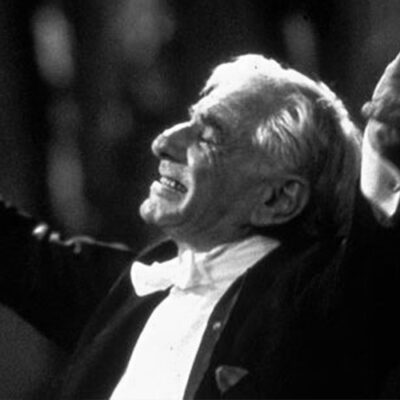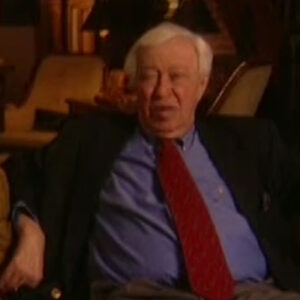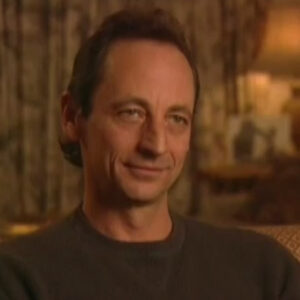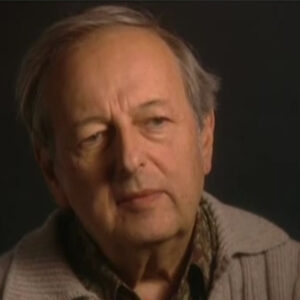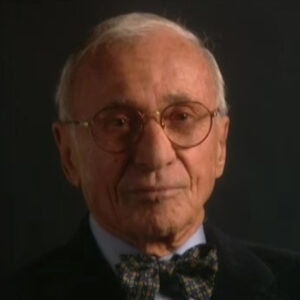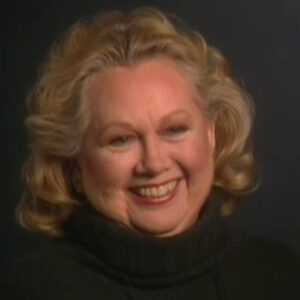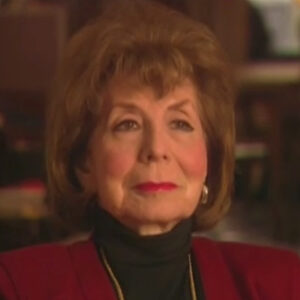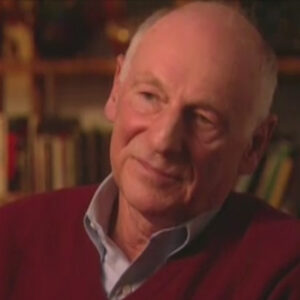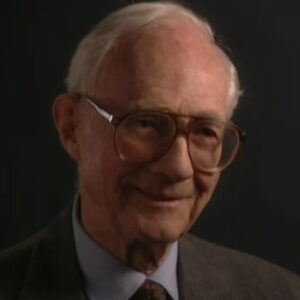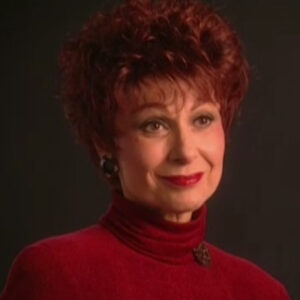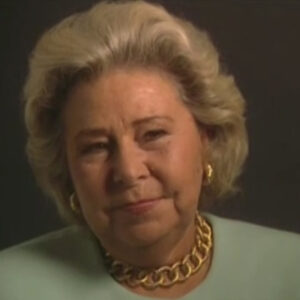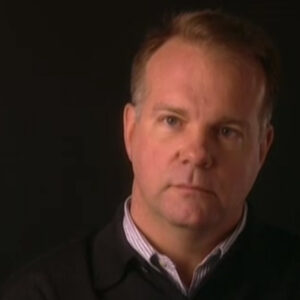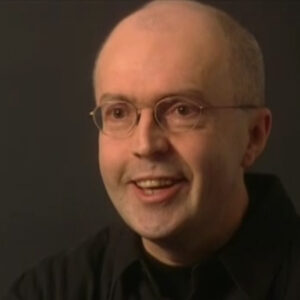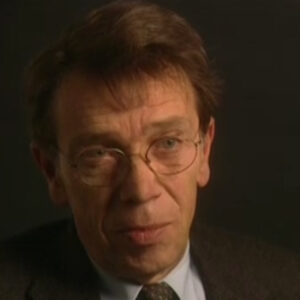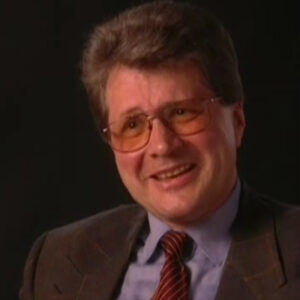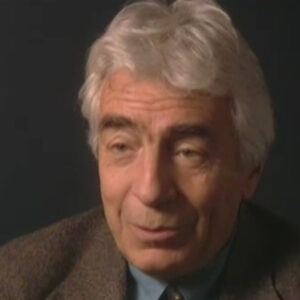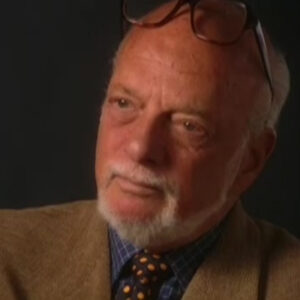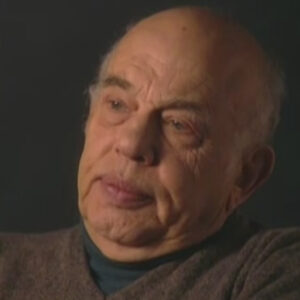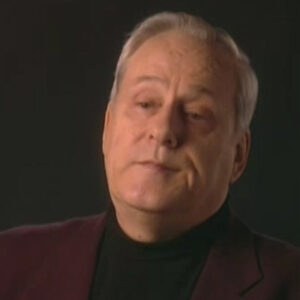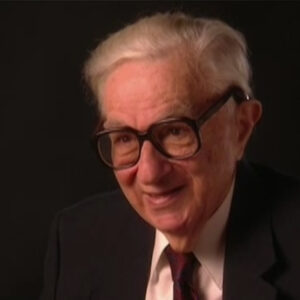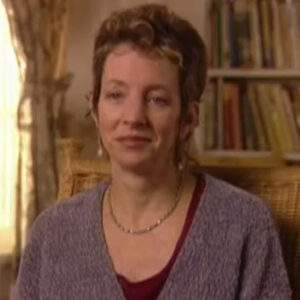Speaker Talking about the Russian singers, it made me wonder, I think, about Lenny who had Russian background, it was a distant background. Lenny had, to some degree, a Russian soul. I mean, when you think of anybody, what is your what I.
Speaker No, I don’t think you have to be necessarily responsible, but I think that was a. Russian gersel.
Speaker We came out very similarly. We both first generation born here and our birthdays are about a little over a month apart and he’s a month and a half older than I am. And the backgrounds were somewhat similar. I don’t know whether his mother is still alive.
Speaker I don’t know. Uh.
Speaker She she was here when he died and.
Speaker How did that Russian Jewish soul manifest?
Speaker Well, we were raised differently, that’s true.
Speaker She was raised very much according to the strictures of the Bible and the strictures of our heritage. And he learned to read Hebrew and to write Hebrew and, um.
Speaker He observed all this. Well, most of the holidays, as I remember later on, when he got busy with the big profession, but. I met him about, I don’t know, within a half year of his first success when he took over because Koussevitzky and. The Jewish thing didn’t come into it very much.
Speaker Severo, Jeremiah, shortly after that, very shortly before Debu, when he’d written it before he’d written it before.
Speaker Yeah, you’re right. It’s a strong work. Yeah.
Speaker Tell me about your first I know I know about your first meeting with Lenny, but maybe you could tell where this bill and how it came about?
Speaker Well, I’d gotten the right to to a ballet, and I got that right because someone advised me to make it short, make it with very few people, make it with almost no sit and try to keep the expenses of it down. Up until then, I think I’d been submitting three act ballets to the company and they didn’t know who I was and. Someone then gave my belly a little push, and so I got the right to do it, then I had to find a composer and a. Guy who do the scenery and the costumes, all those things, and I got as far as finding Oliver Smith. And they were having lunch one day and he said, well, how’s everything coming? And I said, well, it’s all coming fine, except I can’t seem to find a composer. Nobody wants to take a chance on me. And he said, Who have you found? I said, Well, I. I found almost everybody I want except a man named Leonard Bernstein, who I can’t seem to find out where he lives. He says, Oh, I know Lenny. He said he lives right over here at Carnegie Hall. Let’s go call them. And I said, OK, let’s go call and see where we go. And we call them. And we went over to see him and he lived in a little box of a studio. And we shook hands and I gave him the scenario for fancy free and then he played me.
Speaker I don’t know whether it was Jeremiah. Jeremiah probably was.
Speaker And I liked it, and so we just shook hands and said, OK, let’s get going. And it turned out I was going to be on tour for most of the winter. He was going to be in town and we both didn’t know what was going to what was going to happen with him and. He started writing and then came the explosion of the Koussevitzky concert that he took over and suddenly he was nowhere in sight and he kept at it and he kept telephoning me and I telephoned him and we decided on what was good, what was not good, what could be arranged, what couldn’t be arranged. And I didn’t have anyone to play it that could play decently. We had a old German lady who took took up those cudgels and she used to play for me and she was a little deaf. She couldn’t hear me whenever I yelled stop. So they found when they were working in the gym, I found little pinball’s so high they could grab a hold of one end of it. And it was an old fashioned piano with its back up to me.
Speaker And I’d throw them and I’d hit the piano and she’d react to that. And that was my stopping point. And we did most we did most of it that way.
Speaker Um, we got into a little bit of a difference on whether the.
Speaker Second, Bush variation was right or not, but he convinced me he was and then I got on to it, then he wanted the change. It was too late and. We don’t almost all of it, some of it we had it changed tempo because no one could play it as fast as Lenny could play it. No orchestra could. I didn’t I didn’t finish my variation until the opening night, and that ended with the stool cracking underneath me as I got to the finish of it. Uh.
Speaker It was about it is did the process of your collaboration change as the piece went on?
Speaker No, because I read somewhere that Lenny was sending you pieces of recorded pieces of music while you were on the road or not. Sure did that. I guess writing could play now. I think it was recorded because I read that he and Eric with would get to play it together.
Speaker He played parts of it together and Aaron sort of laughed a lot. But no one’s going to be able to play this the way Lenny wants it.
Speaker But then I read that when when it went into rehearsal, you know, Lenny was sometimes coming to rehearsal and he would improvise as you choreographed it on the spot.
Speaker So it really is telling this story.
Speaker It’s true. I was working on a project with Janet Reed. That was the one part I hadn’t done yet. And but I don’t think I improvised anything.
Speaker I don’t remember that well, was was maybe improvised with the wrong word, but was as you were creating the piece he would write, he would go to the piano and write something. Yeah, I guess.
Speaker No, I don’t think so. No, I just wondered about that, you know, the piece of pretty shit.
Speaker His music was the music was, yes, what was what in Lenny’s music did you respond to? I mean, what was it that made you live your life?
Speaker Yes, he had terrific energy, which that piece needed and a no. How about New York and what it sounds like and what it’s like to live here.
Speaker And, um.
Speaker You see, I gave him a five page, six page scenario, which is still valid. Everything is in it. And so he was he had stuff to write to and make for, it wasn’t like he said, came up with a new piece and decided where we put this. The ballistics very much to the scenario. So I didn’t have much space either. I don’t think I would ever do another ballet like that. It’s two it’s practically a play and all the characters have to know their parts very well and what to say, what to gesture, how to react to everything. It doesn’t work well when you put new people in and don’t train for it. I don’t think I’d ever do another ballet like that. It the first one I ever did. And it’s still the hardest one to learn to teach.
Speaker It’s very interesting and you you distinguish that from the difference between physically and on the town is because it’s the fancy phrase of pure ballet, although there are two different materials.
Speaker You know, I know that you say I would never do another ballet like that. Is is it because it’s a pure ballet, whereas on the town has songs and dialogue?
Speaker No, no, that isn’t the reason. It’s just because it was my first ballet and I was a particularly attentive to what made people move there, what made them react, what made them go to the next step. And the what is very important, because you have three strangers to New York here for the first time within the limited space.
Speaker What was pretty obvious before you could say what what were you trying to do?
Speaker I mean, what was your aim? What were you trying to do with that Dalet that hadn’t been done before?
Speaker Well, it was a. It was a present day.
Speaker Event, which, as were as a matter of fact, I was very tired of dancing that whole tour in Russian boots and pants and the black wig and buttoned up collar. And I thought, why am I why are we dancing all this Russian folklore? Why don’t we dance some American folklore? And so therefore found the. The sailors, which is the time that was 1944 all around New York, and I thought, gee, that would be a wonderful subject and I picked on that and I wrote a story to contain a few people that I picked for it. And that worked. I think all those things were were part of it.
Speaker It might be helpful if you said, well, it might be obvious, but if you could just say, why were there sailors around New York at that time? What was what was we were in a war.
Speaker Well, we were dancing at the Old Met Opera, which was down on 40 First Street. And when you left the stage door, you walked out and there were thousands of sailors all over the place.
Speaker And they’re all looking for a good time. And all the girls were out and they were on on the town, as it were, and.
Speaker That, therefore, was very obviously what I was after.
Speaker I sometimes wonder when the curtain goes up. I don’t see what other people want to hear the crowds swirl around. But then I was working with the few people that allowed me so well.
Speaker It was nighttime at the lamp, right? Nighttime with the lamp post. That’s a good title.
Speaker Um, what what was your first reaction for? Many describe many at that time in 1942.
Speaker Well, we were strangers to each other, so there was a lot of sizing each other up and seeing what we were getting into. And he seemed very fine to me. He seemed very, uh, he loved he loved the scenario. He couldn’t wait to get going. Um. We didn’t have much time together because a live split. He stayed in New York, I went on tour and. We had long distance calls to each other and. Long distance differences, long distance agreements. And then before I knew it, he was exploded all over the New York area and then he was a little hard to catch up with. And that was if I had to look for a constant that was always there, it was one is where is linae and how do I get a hold of him and how do I push him into work again? And how do I get some music back to to work on?
Speaker But it was obviously an enjoyable calabro.
Speaker Yes, very much so.
Speaker How did on what was the genesis there for Bansi feet of the town?
Speaker I think.
Speaker All of us, Smith, again, was a man who moved there and he got someone else who else wanted to do it, then asked me and Betty and Adolph whether they wanted to do it. Everyone said yes. And so we all went to work when we could on it. And we all traveled out to the West Coast together where we played fancy free and we met there and worked on the show. Uh.
Speaker Came back. And then we went after George. I want to see all of this with George George Abbott, and he made his yes, if they would drop the beginning and they drop the beginning and off we went.
Speaker And we did this thing because we were all novices. We really were. We didn’t know a goddamn thing about doing a show. I didn’t know that the choreographer would have an assistant even. And so I took on this show, which had about seven big numbers at least.
Speaker Worked my way through the day and night. Uh. And he opened the show and everything went well, except the big ballet and the Act two, which didn’t go well, and George said, well, tell you what we do, we just cut the ballet in half. It was about the trip to Coney Island. And we we do the first part, which is the dream part, and then do the second part later on when we get to Coney Island. I my eyes must’ve rolled back in my head and I said, well, OK. And so then I cut it that way and we put it on and it worked. Uh. So Sara was terrific in that.
Speaker I guess so my questions are going to come from what I know and what I know is from what I’ve read, but things can always be inaccurate that I read in a couple of books that both you and Lenny were initially somewhat reluctant to move ahead in in that direction, because it seemed a little I think the word that came up is something I read from Lenny Lighthearted.
Speaker In other words, you being both being pushed by people to do more serious things and that there was some concern about moving in the direction of musical theater. Is that true?
Speaker Well, I remember there being some talk about it, but there was there was never any big discussion about it. I remember coming up here and there, Lenny, saying, no, it’s got to be more serious. It’s got to be this has got to be that that disappeared on.
Speaker Did did. Is it true that you all sat around one day and kind of created a set of Accredo piece what your aims were or what you’re trying to do, what you weren’t trying to be very confident about it all down that way?
Speaker What are you trying to do with that? What would you how would you summarize what you were trying to do? Why was it so? In film, I’ve got to make sure I don’t have a lot of time to explain what was so explosive and original and a mind blowing about on the town. What was the context? What else was going on? I think so new.
Speaker I think what was so new about is that it was all very contemporary. Very contemporary. It was all happening while well, that was being created. The war was still on and sailors were around. Life was right there on the streets for us to see. And then we saw the idea of picking at New York as if it were a new place for some people to try to find a way around was also very good. So we enjoyed what we were working on.
Speaker So it’s quite fun. Yeah, describe the process for now, you had three people to collaborate with and not just one. What we have is that.
Speaker Well, that worked pretty well when we ran into problems. We took them out so we could do we didn’t have much time. It was not like, well, we’re out of town now. Let’s see what we can do. It’s a matter of fact, we played like two nights in New Haven. That was the opening. And then we moved up to Boston and played, I think, a week there. Then back to New York, so there wasn’t there wasn’t a lot of time to discuss, I should think it over again. Try this. Try that. We had to make up our minds and make a plan and go ahead and work on it. And that’s what we did.
Speaker And so it was contemporary feeling.
Speaker It was an optimistic piece to know it was about it was it had a poignancy, you know, because of the nature. Yes. Could you talk a bit?
Speaker Yes. We didn’t know whether to deepen that or to let it just stand and let it happen, which is the guys here in New York only for 24 hours. And that much happens to them. And then they have to go away. And three others come on again. It’s used very much in shows about New York. Another hundred people get off the train, another hundred people, you see it come up in other shows again. The.
Speaker The it has did you like the revival, by the way, in the park this summer, the park?
Speaker I really couldn’t judge that because I just seen two shows at the same time. I remember what we did and how we did it and what they did and how they did it and try trying to put myself in today. And that was very hard for me.
Speaker Well, the choreography wasn’t as successful as yours.
Speaker I know, but I don’t think I think I got away with a lot that there wasn’t much for me to do, really, because the big numbers were all just numbers. That’s what they were. They were all the boys go to. The spots in New York, so they went to the dance hall, Penny Arcade Machine, this thing. So all the inserts of things and there wasn’t any plot. There was you have to say, well, then what happened there? And then you have to say, well, they had a good time. And that’s sort of general.
Speaker But it did get a story. It did what? It did have a story. It had a scenario wasn’t a particularly deep one, but it did have one.
Speaker No, it didn’t. It didn’t have. The subway girl is a subway section did, yes. But I’m talking about the places where there were five minutes or six or seven minutes of just street dancing, and I had to come up with something and I didn’t quite come up with something. And I kept the audience entertained and fun going on all the time. But it wasn’t.
Speaker It wasn’t a story, ballet did it for its time and probably even now was the amount of dance, pure dance ballet sequences, the proportion of it to other parts of it unusual.
Speaker Wasn’t there more dance than people were?
Speaker I don’t know. I’m not sure about that. I don’t know. That wasn’t the name of it, you know, to give them more than they’d seen before or less or just just what my job is to fill up, to fill the screen of the stage with what was called for.
Speaker What are those the the music has. Well, I have a question. I read that Lenny wrote New York, New York on a train.
Speaker Do you know if this is true? I don’t know if that’s true. When he was unfolding the music for you. Yeah. What was your response to it? It’s is his response. What was yours?
Speaker Oh, excited. What a wonderful idea.
Speaker How did it work? You play music first?
Speaker No, Lenny never played music first. Lenny Lenny got everything ready and that took quite a while. And then he made a speech to me always. And his speech was about why he did this and why he did that and how the music you didn’t hear. It was all like a big composer’s response to why this was going to knock me flat on my face. And and I said, okay, so now. Not now. Why don’t you write? And then he’d get at it.
Speaker And he played like the whole orchestra of Carnegie Hall, stomp his feet and bang on the piano and shouted the words. It was a good.
Speaker Did you laugh a lot when you were working together?
Speaker Yeah, what was what? How would you describe the nature of your of your personal relationships? Did you become friends? We became friends. Yes. How did happen? How did that friendship evolve into it?
Speaker Well, we were so involved together and so involved in his coming into rehearsal, my going over to the studio to hear what he was playing that.
Speaker It didn’t seem to be much more time to have fun with him outside of that, there was little bits here and there. We were a good bunch. I mean, we were nice package together.
Speaker I would like if you could try to wait, I gave you some words, but you didn’t give them back to me, if you could just try to describe the overall mood and environment and aura you were trying to create for the.
Speaker I’ll say that again, I’m sorry. Describe for me what you’re what mood, what what effect you were trying to create the volatility.
Speaker So what we trying to create and just get the play done is get the thing that really talking it.
Speaker I’m going to be seeing the audience is going to be seeing, you know, some stills. And we don’t there’s not a lot of film numbers from the original on the town. But thank you. And I’d like people to be hearing your voice saying this is what we were trying to do. We want to do is about these sailors. They come to town, we want it to feel have a mixture of high spirits and poignancy.
Speaker And whatever you say, you’re saying it’s how I would feel, what I read about it.
Speaker But I’m interested in hearing, you know, I don’t know how the hell we would describe. I think we would we would try to get that that work on the stage and and to make it work. And occasionally we would do something wrong in case we do something very right. But we try to keep it a happy thing and one that kept the audience totally engrossed from beginning to end. And what would happen? What would happen?
Speaker Um.
Speaker So we had some things woven into it, we had a chase woven into it and breaking things or stealing things or needing things that involved getting the police and everything else into it. At the end, it all broke apart and. They were taken back to the to the.
Speaker Wherever it was, the.
Speaker The boatyards, OK, and given a good bye to the girls and three more came on as three more went off.
Speaker Were we still in the war when the. Yes. Yeah, so it was drawing on all of us. Right, right.
Speaker Would you say we were still when it premiered? We were still in war?
Speaker Yes, I can. I had an idea that.
Speaker At one point during the. Well, this goes back to on the town I’m sorry, goes back to a fancy free that at one point when. The power to do it was at its. The hardest moment that the bartender turned over the page and on the front of the page was something about. Some boat that had gone down and that was just sort of just tighten you up for a moment, but it. It didn’t. It felt too much like a fix, so we cut it out, but we were all conscious of what was happening and what was in store that most of the kids that you saw were not going to go never going to go on.
Speaker Right. Might not. Yeah, I think that’s what.
Speaker Takes it from I mean, that gives it a step is in the midst of all these high jinks and fun and high spirits and youthfulness and the optimism that comes naturally with youth is knowing that they’re going to go off the next day and they may not. Yes. I mean, I think that’s what gets kids showed you how to say.
Speaker I guess I’m going to have to say that.
Speaker It’s a hard sometimes you asked me to make large comments about it from the outside, as if I had no participation in the making of it, because all that stuff takes place during the making of it. And you don’t you to step back and say. In a grand voice, this is about such and such. It’s funny that the thing is coming back again, but then all the old shows are coming back again.
Speaker Well, I think that the music does make a difference and it isn’t. There are very few sentimental songs in it, although there are there are some and they seem to work. And the stories are about three people and three girls and how they all get mixed up together. It isn’t just about one person and the love of their life and what comes that way? So I think that the audience’s attention is always spotted, keeps up with one person and keeps up with another and keeps up with a third and it keeps up when they get together. And what happens when they split? And it brings together a varied amount of people. The girls are a taxi cab driver, a girl who’s dancing kooch dance out in Coney Island, and a girl who is exercising her intelligence and the museum by. And analyzing.
Speaker Different kinds of men. And and who’s.
Speaker Artistry and intelligence is always to come by her desire to go ahead and tear everything off and get the town. So I think those things are.
Speaker Not what you expect in the NEWSROOM, musical comedy.
Speaker I think you just hit on something that I had thought about the notion of of three subplots, so to speak, occurring simultaneously, which has now become very commonplace in television series like Hill Street Blues.
Speaker So that was really unusual. That’s very important. I mean, everything was much more linear. This was right. It was a real step forward. Yeah, dramatic.
Speaker Well, it’s a story of three guys in town for 24 hours. And what happens to them? You can sort of just pick whoever you want in and see what happens.
Speaker I know that there were that you did a facsimile preceded West Side Story, didn’t. Oh, yes, yes, there’s nothing that exists visually a facsimile, there’s nothing that there’s I think there’s no record, no tape recording of it.
Speaker I don’t I don’t know if there is. There isn’t.
Speaker Which makes it somewhat difficult. Well, yes, it is within the film. I don’t think it does.
Speaker Yeah, it was it was a great favorite of mothercraft as she came backstage and just gave me a whack over the back and said, oh, my God, you’re really going so well.
Speaker You can see why that would have to my blood memory. Right.
Speaker But what I’m curious is I’ve just read a little bit about that.
Speaker The what sort of inspired that that family, that collaboration between you and my dad. Can you talk about.
Speaker Well, I took the idea from some things that were happening to me in New York among the organizations that I was working with and the people I was working with. And then it was all going through some changes.
Speaker Uh. I based it on.
Speaker The life stories or rather the life behavior of.
Speaker 33 of the people in the company, as a matter in fact, there were just three people in the valley. I believe. And it was Lorik. And there was Johnny Creason, it was myself. And we all had a. A way of behaving. Which was not really a true one, but it was. You could get on very fine with it and we all got really entangled in each other’s lives.
Speaker Was it is it true that that it came to some degree out of your mutual experience with psychoanalysis? Well, I don’t know, because that’s what the books say.
Speaker What is the book? A book for biographies of living.
Speaker Well, I think that’s another one of them actually say that you had both been in Freudian analysis and that this ballet was inspired by that to some degree, having never seen the ballet.
Speaker It’s a little difficult to gauge that. But I was curious about the psychoanalysis part.
Speaker Did you and Lenny talk about your psychoanalysis? So this is not was not a conscious is something that some writers just come up with? OK, forget it.
Speaker And they won’t go. We won’t go. West Side Story.
Speaker Your favorite subject, I’m sure. And you probably so tired of talking about it, but. It is, in my view, the greatest work written for the musical theater, and so it’s going to be, I hope well, it’s based on a very great story.
Speaker So I’m going to try to talk with you as much as I can about that. And I hope that it doesn’t get boring for you because I know you’ve talk about it so much, but I’m not going to in the film. I don’t have a lot of time.
Speaker I’m going to just summarize it in narration to give the whole background and how difficult it was for the first producers pulled out and finally got saved, because I would rather have the focus be on the artistry of it and the nature of the creation of this.
Speaker The piece for. But these four remarkable people came together and did this piece. I know that you have said that in past interviews, someone six well, on every level.
Speaker That’s that’s not so surprising when you think of the history of it. Um. You know, we we had. Submitted that scenario. The play, if you want to call it our work. To almost every producer on Broadway. And everyone shook their heads at it, no. We don’t want to do that, that’s too. Depressing, it’s two down.
Speaker And there was one time when. What was your name?
Speaker A lady producer, Cheryl Crawford, who decided she was going to do it and she stuck with it and then she arranged a. Audition hearing of it in her place, and we all were there, Lenny, Steve, author myself. And in a room full of potential backers. And we read through the play and acted through the play, and I could see that when it started, it was sort of flattish. So when I got up to describe the first. For your first dance to this, I got all excited about it and sort of described it very fully and.
Speaker And and then we went on again and.
Speaker We thought we did very well.
Speaker We thought we did very, very well and we left.
Speaker And then next day, Cheryl called us and said, I’m sorry I didn’t raise a cent. I didn’t raise a penny and I said, well, where does that leave us? And she says, well, I’m afraid I’m going to have to drop out, drop out of it, which is very bad news for us, but not. Exceptional news, it was the same news that we’d gotten for everybody else that we applied to, including our best friends who are best producers, who, et cetera, et cetera.
Speaker So. I think it was. Steve, who suggested that he could speak to a.
Speaker Her parents and his friend, uh. I can’t think I’m sorry I’m bad with names. Thank you, Poppy Griffitts and. So he went off and made a telephone call and came back and said yes, they said yes. I said, What do you mean? They said yes, said that they’ll produce it. And this will be the rehearsal time. And this will be when we’ll get started and move it. And we laid it all out and I told them I’m going to need to double the rehearsal time because I’m going to do all the dancing and stage all the rest of the work. So I worked first for four weeks on Dance’s, et cetera, and then I started on the book and all and we all. We are fed into it. I divided the company up into two groups and they were not allowed to talk to each other and I did everything I could to instigate the tension that went on in it. Some people think, don’t you think you did wrong? I said, I don’t know, but I work that way. And that’s the way I worked.
Speaker And, well, you were you went to great lengths to achieve authenticity.
Speaker Yes. And some people call that the method.
Speaker Some people call it called the method Stanislavski’s.
Speaker I mean, some of the actors have talked about how you imbued you know, they weren’t just dancers. Each person was a character. You know, who they were by their parents. Right. You know.
Speaker Right. I try to make them live their whole life. And that this was just a part of it on a stage and some took to it, some didn’t and some took to it and then dropped it and went back to playing for the audience.
Speaker What were some of the other ways in which you tried to achieve this authenticity?
Speaker Well, I went up to watch the dancers in Harlem and Spanish Harlem, and I became friends with some of the. I was going to say club members, but isn’t what I mean. Uh. The guys who ran the gangs themselves. There was one guy who was always snapping his fingers and he was sort of like a sub sub person, and there are things I saw which I couldn’t use when one team wore a flower attached to the cuff. And when I put it on the stage, I thought, no one is going to believe that, you know, that looks like. Falsehood. And a lot of the casting came out of out of came out of the kids themselves who were right out of high school, right out of. The school’s performing arts, and they look like less than teenage kids and some of them knew more than I knew or right were ahead of it. And what’s so strange about it is that. No one place their age anymore and no one plays. The. Limits of what they knew, because in those days they were not used to knives. They were not used to the idea that someone might get killed. That was just the very beginning of all of that. So you have to watch how you cast it, too, and we get we get away with accepting the fact that. Someone can get killed. Is a matter of fact, what one interesting story was that I had gotten very close to all the people I worked with up and up in Harlem, and I asked them if they wanted to come down and watch the show, and they said yes. And I arranged for I don’t know how many seats, 10, 12 seats, 14 seats. And they came down and they watched the show up to the end of Act One, which ended with two dead bodies on stage. Uh. And they came out and. They were on the street corner talking and then they said goodbye. What do you mean, goodbye? It wasn’t at the end of the show. I said, no, that’s only the first half. And see what happens after that and strange expressions cross their faces about, oh, there’s more than just death. You know, there’s something after it, so back they went into the theater again and they didn’t expect any more.
Speaker How did you come up with the concept?
Speaker A friend of mine was offered the part of Romeo, a very good actor, and he asked whether I would read it. He said that he found it very normal, not much excitement in his life. So I read it and I thought, what the hell would I do to try to make this alive? And I thought, well, what if I made it today? How would I feel about it? And that was a. And that’s all I needed, and bang, I was into it.
Speaker And no one knows all the story about how I first.
Speaker I offered it again to. Author and TEUs.
Speaker Lenny and again, not even wanted to work on it, Lenny didn’t want to work on a on a musical for. Often and author didn’t want to work on.
Speaker A book for a play by featuring Lennon’s music, and they walked away from it, then they came back to me again and now they had another idea for another story. And I knew that the plot of the story and I said, no, no, no, you can’t expect me to give up this for that. That’s that’s never going to work. That’ll work. But it won’t be like what this will be. And so I took him back into it again and they decided, yes, they would do it and we will work together. And we all did. Thank goodness.
Speaker So I read of that you said something like that, and it was a challenge to take these extraordinary talents yours known in the classical ballet world, Lenny, as you say along here, composer, and bring these talents together.
Speaker Stephen, relatively unknown at that time, but the main thing was to take these serious artists and you and Lenny were really considered serious artists and create something. Right, a popular stage. Yes. It would be very helpful if you could say that.
Speaker Well, I did have the clear image of why do we always have to do.
Speaker Rather.
Speaker Free cheapish stories and musical comedies, why can’t we do something where we use the best part of ourselves? Why do I have to go over to the ballet company and to.
Speaker Uh.
Speaker What’s that one that we talked about for a little bit?
Speaker No. The.
Speaker There were no images left of it. Three, three people. What did you say, facsimile? Why do they have to do that over there? Why did Lenny have to write a symphony? Jeremiah, why did author have to write? Something I forget the name of it, something about a woman who was of a mind and said, why can’t we put those all together into a work that we like and try our best to put up with our best features that we’re capable of into into a work that now looks like an ordinary Broadway show. So we did. And then.
Speaker It has been I can hardly think about it without imagining the excitement you all must have felt every day as this was coming together. And in retrospect, that’s an easy thing to say. Did you know at the time that you were making history?
Speaker No.
Speaker No, we didn’t. I was going to be a hit and miss what we didn’t know what we just kept working and kept working and kept working and we sort of decided, oh, that’s not so bad. Most of it’s good. You know, this can be fixed. That can be fixed.
Speaker But you knew it was great.
Speaker I didn’t know it was great. No good.
Speaker Oh, hard to believe. I can’t imagine anybody seeing that. We’re seeing your work there and dances in the way the story unfolded, the music and not a little bit.
Speaker Maybe the producers did. Maybe they should. You know, they’re just watching it. So, um.
Speaker So how how would you say from both a dance and a musical standpoint? West Side Story broke new ground. How would I say how would you describe from both a dance perspective and a musical perspective? Yes. How West Side Story broke. New ground, broke new new ground.
Speaker God, I don’t know if someone else can say that.
Speaker I don’t think about the music then because everybody’s already talked about the dance. So every American can have more stories and less a story about you than ballet.
Speaker You know, somebody actually should do just the whole documentary on West Side Story. It would be fascinating. And I’m sick that I have to limit it, you know, to squeeze it in in the film.
Speaker Well, maybe you’ll get more requests.
Speaker It’s it’s it’s phenomenal. But musically, it did break new ground. Can you talk about that?
Speaker No, I think I’ve actually got to learn in order to or to not read. I know, but but it’s his it’s his material and. I think that he was just trying to do the best that he could with what was given to him to do. That he was trying to write.
Speaker Maria. Boy, boy.
Speaker Crazy boy, I have a love, whatever it was, I think he was trying to write pieces that would that would carry an audience onward with the ballet, with the story.
Speaker But weren’t there musical elements here that have not been heard on a Broadway stage, Symphonic Elements Fugues Quintet? Probably wasn’t that rather probably.
Speaker You know, it was a big mixture. You know, there were songs which were very easily come to and very easily understood, I feel pretty.
Speaker Geophysics.
Speaker And there was a great mixture there which which all worked.
Speaker So I read also that or maybe it was actually, I don’t know, one of the two of you said that that the key to West Story that the two of you were always trying to do was to achieve that balance between reality and poetry. So with that, would you say?
Speaker Yeah, I would say that’s true. Do you think you could say that? Yes, it was a place for us to try to be as serious. About our work as we would be as if we were doing a major artwork and we’re not engaged in superficial.
Speaker Musical comedy. And I think we will keep trying for that.
Speaker We only had one one slight.
Speaker Hesitation, which was set in Washington, I think we we wrote a song for the three of the kids. About when they grow up, what they’ll be like, and it was it was good. It worked well. And the only thing is that Arthur and.
Speaker Martha and.
Speaker Then he just didn’t figure that it fit in. I didn’t feel it did stick out, but they did feel it did. Yet yet they left. Officer Krupke, where it was, which is not a good place for it, and the other one cool in those two should have been switched and that would have been made more sense.
Speaker The movie did switch on. Yes, I agree with you. You agree? Steven still feels that was a mistake. Yeah, so does Arthur. Yeah, but it makes much more sense. Yeah. Makes much more sense. So you were not one of the ones in favor. I see. So it really was a. Yeah. I mean you had you have. Oh people gave all the time.
Speaker How would you describe that. You describe that collaboration very beautifully in the Dramatist Guild symposium that you did in 1985. I remember all of you were there like you’re still around. And you described it as actually somebody began by saying that this would be the symposium would probably be like Rashomon, that everyone remembers West Side Story differently, that’s all.
Speaker First of all, why is that? Why do you think that? Well, because I was. Pulling his guns at that point, that’s all.
Speaker But they didn’t seem to me from reading it that there are wildly varying interpretations, not not before, not before we opened, only after we opened what happened in. I don’t know whether I can talk about the. I think people began to get very. A lot of pressure, but. We found ourselves having to say things about our outlooks after the thing had opened, which were not true during the thing. That’s so.
Speaker That’s interesting. I mean, do you think that created a certain false about it, not falseness?
Speaker No. You know, everyone wanted to shift at something somewhere could have been moved a little bit so that those things came to came to fact.
Speaker But you you were the one in the symposium. I was very impressed with that. Who kept reminding everyone that the fact is after the fact is one thing, but at the time nobody was thinking this was my idea so that it was truly a collective lecture on the high school. Right. Could you say that to me?
Speaker Well, I think we all worked on that on that level of a collaboration of three people, a book writer, a songwriter, a dance writer.
Speaker We’re working to make the thing one piece all the way through, and I think we will work that way and we made changes. It was everyone’s agreement about the changes and then once the show opened in.
Speaker Things began to be written about it and, uh.
Speaker Some people felt that they ought to be more about themselves and less about the three of us. I guess I don’t know. That it began to turn a little. Crooked, not crooked. That’s a bad word.
Speaker Do you think Lanny did that? No, Lanny didn’t.
Speaker I didn’t think so, because I know that, you know you know that famous story about the.
Speaker The oboe player or whatever, who goes on holiday and he decides instead of going on holiday, goes to hear the orchestra and he comes out and he says, my goodness, it’s it was so fabulous.
Speaker It was so wonderful. I had no idea what everybody else did. Yeah. Yeah.
Speaker I think one of the aspects of collaboration is, is for the collaboration to really work.
Speaker Each person really has to bring so much of themselves to it that each person kind of feels it’s their baby and, you know, it’s also our baby. But there has to be that kind of emotional investment. I think each person has to be really emotionally invested.
Speaker Well, I don’t. I don’t know if I would call a 100 percent perfect, you know, that there isn’t anything that I wouldn’t criticize even now. And I think that’s true of all of us so much. My field is that’s a little too much and that’s a little too much and it’s a little too little of this. And, you know, we could also put our fingers on things and try to try to make it better.
Speaker What do you think? Let me just play some of the things that Stephen Sondheim said.
Speaker He talked a bit about Lenny strength as a drunk, as a as a as a narrative driven musician, that he is his strength, the theater with drunk and how the music and the dance worked together so well to convey the meaning of the story. Could you talk about Lenny’s strengths or weaknesses of him, as you may feel, as in the theater, as a man of the theater?
Speaker I kind to go back to them because. I haven’t worked with him recently. Um, well, when we all got bitten, that’s what it comes down to.
Speaker We all got bitten by the bug with that of that story and therefore called out the best of us. Or I don’t feel anyone was sort of retracting as they were working. If anything, we were pushing on and if we had not a new idea, we’d brought it up and talked about it. And Lenny was quite good about it then. He was.
Speaker We felt some of it was a little overdone and he cut. You know, you don’t have the whole the whole story, you know, we had to.
Speaker Well, for instance, the whole prologue. Started out as a vocal piece.
Speaker It started out as I think we used to go off track of the track and it was about the kids sitting around talking about what they would do if they had the choices of getting out of this world and taking it, uh, a joy ride on a space.
Speaker And it just didn’t work, and we found that out pretty rapidly, and then we just converted the whole thing as it was, without the sounds to the prologue.
Speaker And it work perfectly and we need a little expansion, we could put that in if we need a little condensation, you could put that in. That wasn’t hard for him to do. He was very.
Speaker I think he was he was he was quite. Um, liberal. With what was needed of him to try to make a peace work. So he was he was quite strong, we.
Speaker Stevens said he felt that learning that the strength and musically of West Side Story was the dance music, that he didn’t think, however, that Lenny wrote particularly good songs. How do you feel about that?
Speaker Well, I know I had a I had to create new material for the dance things, for the songs. I had to find out how to stage.
Speaker Uh. That might be.
Speaker Steve’s feeling about it because he likes to write both, so, uh.
Speaker When you look back on that experience, the original, when you look back on it in your mind, you back on that original Broadway show, what stands out in your mind the most? What are the images that you saw that you float across your brain?
Speaker Well, that we got it.
Speaker I think that was that was a big thing to accomplish, that we all work very, very hard for the eight weeks of rehearsal and got it done and played it out of town.
Speaker I remember Steve coming back to New York with me on a. On the plane, and he’s saying that I don’t understand why everyone says it’s so hard to do play out of town is terrible. He said, I wish we had more trouble. It was so easy. And I said, for God sakes, cross your lips and don’t ever bring that up again because you’re going to have it. And it just because it didn’t happen this time doesn’t mean it isn’t going to happen again. And you’ll find yourself in the worst trouble ever.
Speaker And it was in a way, very good that way. We had we had a.
Speaker We had a good compact group, very good compact group.
Speaker And what do you think West Side Story has last?
Speaker I don’t know. I don’t know.
Speaker I’ve never I’ve never thought about I think that there’s something in it that the kids love. I love the idea of some story about their life, which this is about, and they.
Speaker I I don’t know outside of that. What unless it’s just that that the that they can get themselves out on the stage. And performant.
Speaker Well, there it is, dealing with certain universal I mean, Romeo Juliet last, I mean, it’s dealing with certain universal truth. Yeah. What would you say they are?
Speaker What but what can I say? What is the universal truths, universal truths, universal concepts to universal emotions that are embodied in West Side Story.
Speaker Well, it’s about. A love story between two opposite. Factions that get together and. Fathom through. What the circumstances are. And it does lead to. The death of one, I think it was.
Speaker Who’s the man who wrote King and I Am? It’s about the music here about Hammerstein, Rodgers Rodgers.
Speaker I think it was Rodgers who. Said you don’t need to kill her off, she’s as good as a. We did we did have one point, both of them going. We considered almost everything in that play. I think it was a good thing that we had all that trouble in the beginning of getting someone who liked it enough to want to go ahead with it. And it’s so hard now to think that. Almost every. Real producer, I think they were real producers then and now they’re the money producers, but they aren’t the real producers, but every producer then said no to it.
Speaker I don’t know if that’s answering your question or not, but.
Speaker I’d like to ask you something. I asked you once before because because I think it is the thing that.
Speaker Makes West Side Story Transend, and that is that balance between poetry and realism and realism and realism.
Speaker How how how did you how did you maintain that?
Speaker Well, if you just say those words and say, well, we’re going to make it very poetic or very realistic, your head has to switch back and forth and you’ve got to find a tone that that that everything will fit into. So I kept that in mind. For instance, the first balcony scene where as the as a singing the songs, the whole background disappears and slowly the stars come out and they’re up there in the sky is a poetic version of that. And that wasn’t it was not a dance and it worked very well. And at the end of it, the stars faded and finally the buildings all came back and you were back where you were. And then that’s how you get realism and. And that realism or that when Romeo and Juliet spy each other, everyone else disappears. And they meet and then suddenly they all come back again and they come back again. So I think I can use the stage as a poetic piece. And that’s what I wanted to achieve in that.
Speaker And you did. Now, how how did this collaboration work?
Speaker What do you mean? No, I mean, what was the process of it? It began with your concept. Yeah. Then Arthur would do a book. I mean, how and then he would give that the scenarios to Lenny. Yeah. And, you know, how did I. It’s it’s fascinating to me to figure out how a composer and a choreographer work together apart from each other to create with this incredible thing. I can’t figure out how you did it.
Speaker Well, we had many talks. And we all really talk about what we were trying to achieve. The thing I just said before. And that we had to bring up the best of our abilities to this endeavor. And make it. Into a piece of what you call poetry and realism.
Speaker Would you get a piece of music and then choreograph to the music? Oh, yes, you could. Maybe that would be helpful.
Speaker Yeah, no, no, I can’t I can’t choreograph to no music unless I do that.
Speaker I mean, I didn’t think so, but. Well, I have I’ve done a ballet without any music. Really. Yeah. Which part. It’s called the moves.
Speaker It never has no music, do you like it? Yes, I do. I thought it was because I started to do a score that.
Speaker So I guess my name is again, it’s.
Speaker He’s an American composer and he’s quite well known.
Speaker Who is he alive? He is alive. Yes. Uh. I say Elmo, but it isn’t an Elmo.
Speaker I lost.
Speaker Well, I asked him if he would write me a score for something I wanted to do and I said I’d like to make a series of waltzes or something like that. So he went away. Then he called me and said, You want to come over? I’ve got some material, what you think about it. So I went over and I listened to it and rather liked it. It was it was sort of a little Malus. Inactive than I would I would have liked it, um. And he didn’t have much, but he had some. And so I said this let me take let me take the rhythms down.
Speaker And let me choreograph some to the rhythm and see how it works out. So he did that and I was working away at that with my group, and then suddenly I stopped in and watched it and I thought, gee, that’s that’s interesting. What if it had no music? What if if just had tempo’s at certain temples that the people danced to, what would that be like? So I went from there on. And I did a twenty eight minute seemed. That when they finally cut it down to 25. And it worked well and it works better now than it did then, and the audience is not upset by it. They know what they’re coming to see and. And they see it so. I hope that that happens as well with them.
Speaker They know that they will be. Welcome to hearing that score on tape.
Speaker With the Russians, with the Russians singers, which is the important part of it sounds it sounds wonderful.
Speaker Well, it should, but who can tell? Let’s go back to West Side Story for a moment. Um.
Speaker It’s worth Lenni involved in the rehearsal process.
Speaker Well, he was busy writing like crazy and he’d bring in something which would be good and I’d listen to it. And I said, well, let me take that home and study it a little bit and then get to work on it. Oh.
Speaker He was involved in it, but how what how would you describe it? I think we can just hear it. I think it’s OK. What was the single most difficult aspect of the casting and all other people have talked a little bit about this, that the you know, how unusual it was that you needed to have people who could both sing and dance and be 14 years old?
Speaker Yeah. Um, could you talk about your process?
Speaker Well, I said that that search out every place that we can find that can turn on anyone that’s like this. And we did that. So we went through all the schools, all the programs, all the. And then we also had open calls and picked people from there, and then we put them together and picked the ones we like the best, and that was that was how we did it.
Speaker Do you remember your audition with Carol Lawrence?
Speaker My audition?
Speaker Well, the auditions, you remember because I had did an interview with Carol.
Speaker I said talked about the process and the number of interviews, auditions that she that she did.
Speaker I don’t remember that. We either like to try to get her off of her fancy clothes and into. Much more.
Speaker A quiet place, she wore ringlets and everything came all all dressed for the wrong part of.
Speaker And she was good. She could look very sweet, very innocent.
Speaker She was OK.
Speaker I’m trying to just think back quickly over the cash and what it was like, and I’m having a hard time with that. Uh.
Speaker Do you remember the.
Speaker Her asking if she and Larry could take the script home the night before the audition.
Speaker What did they say? Reluctantly, yes, reluctantly.
Speaker Oh, you’re not. You were reluctant. Oh, OK. They came in and they had had a chance to prepare.
Speaker But I think that you you did something unusual. According to Carol, you you made her go up some place in the rafters. And and when Larry came looking for her, he had to really find her. And if he really was coming from that gym looking for year and he had to sort of find herself up there and it was sort of a challenge everyone has talked about.
Speaker Your genius, which, of course, comes as no surprise to you as really being almost singular in this century, your vision and you also as a perfectionist.
Speaker How do you see yourself, because that’s too hard.
Speaker But I mean, do you think I mean, I understand that you you you start off a rehearsal session and you say, I’m going to be very difficult, but but don’t take it personally. That’s just the way I am.
Speaker That’s true. Can you tell me that?
Speaker Well, you know, I.
Speaker I’m working from it’s already done point of view. In other words, I’m working from I see where it’s going to go, so I try to move them to it as fast as I can. And so therefore, if they don’t get it, I get impatient and I say, come on, come on, let’s move this now.
Speaker And I forget that they’re are trying trying to to be the very best that they can. So I think that’s what makes them say I’m quite impatient or a perfectionist, perfectionist of every single person that I’ve talked to and everything from everything I’ve read.
Speaker It is very clear that you are the artist that many respected the most.
Speaker How do you feel about how did you feel that way? Oh, right.
Speaker How do I feel about when I’m talking as an artist?
Speaker I mean, he totally respected your judgment, your taste, your choices, your originality, your vision.
Speaker Well, if he’s if he’s working.
Speaker If he’s really working completely and I can’t wait to hear what he’s got and I can’t wait for him to play it for me and explain all the parts of it to me and explain why he did this and why he did that. And if I don’t agree, I speak up right away and say, well, you know, I make him explain himself and for me to give my reaction so that he is both and either he wins or I win. I mean, he talks me into it or I talk him out of it. And I think that is wonderful that way.
Speaker I think in more recent years, I have to hold him down so that he isn’t. Writing an enormous work for a place which doesn’t need an enormous work right there.
Speaker We didn’t work very much together the last few years, um, he got more and more busy with all his work and I got more more busy with all my work. And he sort of went apart, except for what was very glad to see each other and. Very happy to spend a couple of minutes together. We had them. I miss him. I can’t believe that he’s that he’s gone. That’s that’s the hard thing for me to.
Speaker Believe. That’s all I can say about it.
Speaker He what was the vacuum? Do you think he left the vacuum?
Speaker Oh, God takes care of all of music in America. Uh. He was the. In what way? And everywhere he everywhere he goes, everywhere he composed, everywhere he committed himself to music or his conducting. Everywhere, everywhere he touched, he left the. He left a place for himself and for all of his talent.
Speaker What do you think were his singular gifts? Oh, I don’t know what that is and what made him a better conductor. There are more what made his conducting different from somebody else’s?
Speaker What was singular isn’t his enthusiasm. Is this belief in the music that he was conducting?
Speaker And his interpretation of it and his need to force out of the company of musicians and what he felt about it and they went along with it.
Speaker Do you feel that was that I mean, was that unusual?
Speaker Well, it appeared unusual, God knows he whipped them up and quite often when I would go to see something that I wanted to hear, I wouldn’t look so much. Because I would get carried away by his driving and I would want to just hear what the results were. That’s very interesting.
Speaker Did you feel that the results were the same as if he hadn’t been moving around?
Speaker I can’t tell. We said you said last week something so interesting. You said that, you know, Lenny was criticized so much for all the things and so forth you said.
Speaker But he said if you close your eyes and listen, it was all there. Yeah. It would have been there even without the antics. But the antics, I think were were really something. Lenny.
Speaker Yeah, I think so. Um, I read something one of the London critics actually said that Lenny on the podium looked like he was choreographed by Jerry Robbins.
Speaker That’s nice.
Speaker I but I really think that he didn’t have a choice about how he was on the show. He didn’t seem utterly out of is his need for some kind of statement to communicate to musicians.
Speaker Well, he once conducted I heard it twice, um, the rite of Spring. And the second time it was amazing. It was like he got carried away. And the. He got carried away with the tempo and the speed with which he was doing it and the orchestra followed him, just followed him and played it just as fast as he wanted and did it just as crisply. It was terrific and never heard anything like that in my life.
Speaker What what do you other than that, the Stravinsky, what do you think were his strengths as a as a conductor? What what what composers did you feel?
Speaker Well, I don’t know. I can’t answer you a Mahler fan.
Speaker No, not particularly Mahler, Lenny. They seem to be together. Yeah, I you know, I joined at the hip, so to speak.
Speaker Um. When you look back and you remember your relationship with money like it was professionals, you colleagues, you collaborated, you were also friends.
Speaker Are there any personal moments that stand out? Well, I was thinking about that. I was trying to remember because I. I’ve been to visit him up in fear, fear, fear. Feel, is that right? And I enjoyed that very, very much. And I liked his relationship with his family. I thought that was very, very nice and his what did he call it?
Speaker It’s. He used a technical.
Speaker Verb for the kind of tennis he used to play with this with his brother. It’s like. Tim. Teenage or something like that, but it was it was a. Freudian name for it.
Speaker I can’t let him beat me.
Speaker Did you think Lenny was competitive? I think he was in a good sense or not.
Speaker I mean, I don’t know, I think he liked being the center of things.
Speaker And he did.
Speaker Did you feel that? Did you talk about personal things? Did you talk about your father’s, for example? We did a little bit.
Speaker What was the nature of those discussions? The differences?
Speaker He followed his father very, very closely. I didn’t.
Speaker But both of you had fathers, didn’t you, didn’t particularly encourage you in the field, you went into the field in the fields that you went into?
Speaker No, I did not want to be. You know, my father didn’t. Was that a bond?
Speaker No. So you don’t feel that was a particularly no motivator?
Speaker No, that was this was one thing when you tried many other collaborations over the years with money after research school. Yeah. And you did do the book together, I believe, after that. Yes. But you try Skin of our teeth that the infamous exception and the rule. Why did those collaboration’s not material?
Speaker I realize that, well, it’s like he he was not free to do anything, he could only squeeze it in between these two months and those two months. And if he didn’t write what you thought was absolutely necessary and correct and if he wasn’t really into it, which I never felt he ever got.
Speaker Although he wrote some wonderful stuff for.
Speaker Skin of our teeth really good.
Speaker Did any of that ever see the light of day? I’m sure it has. Oh, right.
Speaker Yeah. Let me borrow from. Right, right. Private. I think that’s OK.
Speaker Well, yes, except except every time I hear it, I’m thinking of the original. There is no peace. I think well, that’s nice of you have it, you can use it another way, why not?
Speaker Did you ever have another collaboration you enjoy working with? It’s not just like I don’t know.
Speaker Let me think as a musician. I don’t think so. That was that was a lie. Uh, could you give me a whole sentence on a whole sentence? No, I don’t think I did. Who was alive? I don’t think I had another collaborator that I’ve worked with Lennie’s as much as I did with him, although I’ve used a lot of Bach. I’ve used a lot of.
Speaker Chopin, a lot of Mozart. ET cetera, et cetera.
Speaker But they were alive to know, they always say, well, there aren’t very many, like many, you can say that without my body.
Speaker You could just say that again, there aren’t very many like Linae that can contribute with their talents and their energies to your contribution.
Speaker Do you think that Lenny was a spiritual man, a spiritual man?
Speaker I don’t know. That’s not a side of Lenny that you know, I don’t know what you mean by that.
Speaker Well, a man concerned with the deeper issues of life, but the deeper question of life, questions of faith, questions of God, questions of humanity.
Speaker Yeah, I think he’s very deep in that. Yes.
Speaker I don’t think.
Speaker I don’t think I am the same way, no. No, not as much as he he really went deep into all those things and into his religion and. All of that.
Speaker And so that wasn’t something that you shared.
Speaker I was curious about. And it was something like listen to.
Speaker He didn’t push it toward me, no.
Speaker Did money change over the years, did any change from your perspective?
Speaker Oh, well, I’m sure he did for me. Well, I never knew him as intimately as when I was working with him. And, you know, I could make jokes with him and laugh with him and do all those other things, too. But then it got to a point where it was just the work. That went back and forth between us and.
Speaker He was very disappointed when some of the collaboration’s, particularly, I think the exception and the rule didn’t materialize.
Speaker Uh, did you feel the same disappointment? Did you? Yes.
Speaker Yes, I did. I felt that he wasn’t up to it. And I don’t mean that in a bad sense. I mean, that is.
Speaker That he was trying very hard to to to to make that work for him and he couldn’t make it work. That can happen to anybody, I suppose, depending upon when you hit them.
Speaker Did you know how disappointed he was?
Speaker But no. No, I don’t think I did quite as much as the way you put it.
Speaker Well, I may have even a better sense of that, because I’ve had a chance to I’ve been given the privilege of reading so many of his letters and his inner, I should say, he was genuinely grieved about that.
Speaker But I think that Lenny, towards the end of his life, became quite worried that his gifts were slipping. I see. And when so many things that he put a lot of effort into didn’t work out, it was it was harder than it might have been.
Speaker Well, that’s true for all of us. We don’t know quite what’s left inside yet to work on and whether it will come out or not.
Speaker Did you ever sense that about Lenny, that he was a self questioning then, that he was a self questioning man?
Speaker I don’t know, I can’t answer that.
Speaker Did you ever sense any doubt on his part about his own gifts?
Speaker Well, I think that when he couldn’t work on something, that there was doubt there. Yes. And that was getting to be hard for him.
Speaker Do you think that. Larry was I mean, how would you go in ways we don’t like these questions, but they are useful to get a sense of somebody’s place in history. Where would you place Lanny as a composer in 20th century America?
Speaker Oh, God, that’s that’s a big question.
Speaker I don’t know whether I can match my last.
Speaker I don’t think I don’t know whether we can place him there now. It’s almost like too early. I’d like to see where we place in 10 years from now, what will last, what will become more famous or what will. That’s why I feel that he isn’t quite dead yet, I don’t feel like his work is finished and that probably it’ll go on for quite a while.
Speaker Do you think then that this is. I’m curious about is that the measure of.
Speaker Somebodies importance is whether the work last in the public’s mind.
Speaker This is what is getting to work is is the measure of someone’s artistic importance. Yes. The degree to which their work lasts in the minds of the public.
Speaker Well, the public changes and God knows Buck disappeared right after he died. There’s no. There was very little played of his, then he came back again and now announced he’s he’s so I can’t tell, but you know what you mean the effect that the public is dependent on what is fed to them.
Speaker OK.
Speaker I agree with that, I only asked you because you said it’ll be interesting to see what of Lenny’s works last or become more popular. Yeah, I guess my view is that if nobody ever listened to anything Leny ever wrote again, it doesn’t diminish that they need. He wrote beautiful music and he wrote a lot of beautiful music in this century, most of which people don’t know. Yeah, interesting.
Speaker Yeah, but your work, uh, well, well, it’s hard to can’t compare those because my work can die if I’m not here to overlook it and see it and see that it goes on and goes on. Well I don’t know what will happen to it and it may look like old strange and who knows what will happen. It’s very it’s very difficult to follow any choreographies work.
Speaker I mean, who knows what? The.
Speaker You know, the people who have gone with what they’re like. So I don’t know how long it will last. I’m curious that fancy is still. Working away at so many performances per year, both at ABC and in NYC and in other countries of the way, and I don’t know what the hell it’ll look like 10 or 20 years after I’m gone, who knows?
Speaker How does the choreographer do that? And how did Balanchine pass on how he wanted his work?
Speaker Well, he had a lot of it films, which is not a not a good way of keeping it as a record, keeping it as a performance. It’s only a good way to study as a record. Oh, I see they all repeated the same step on the other side, it is a good way of catching it.
Speaker I don’t know, it’s a it’s a very viable.
Speaker Subject, volatile, so volatile. OK.
Speaker Oh, I know how you feel about it, but, boy, it would seem a very good idea to get that get low cost the hell of a lot of money and costs a hell of a lot of making.
Speaker Papau Channel 13 wanted to do a one hour. One 50 minute, 60 minute program on our fiftieth anniversary, which is just coming up, and they can’t raise enough money. To do to do anything and and what they offered me came to three minutes of a an hour long ballet and five minutes of another hour long ballet. And so there I am stuck with eight minutes within one hour of representing the whole company for 50 years.
Speaker And I believe in that. I just I just don’t believe in it. I don’t think it’s worth. It’s worth it, because once you put it down that way, that’s it. Like that peace can never be done again except that way, and they can’t do that in.
Speaker A half hour.
Speaker Now, I understand your concern about it.
Speaker Let me let me ask you one last thing. Is there anything I haven’t asked you that you’d like to say about.
Speaker No. No, I’m glad I stuck with him. And. I feel I’ve been privileged to work with him as well as I did as long as I did, and on as many things as I did, it was fun to do. It was hard work to do. But I enjoyed all of it. I really enjoyed all of it. And I miss Cynthia.

